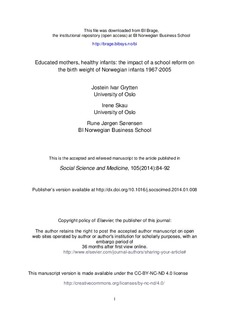Educated mothers, healthy infants: the impact of a school reform on the birth weight of Norwegian infants 1967-2005
Journal article, Peer reviewed
Permanent lenke
http://hdl.handle.net/11250/2379734Utgivelsesdato
2014Metadata
Vis full innførselSamlinger
- Scientific articles [2181]
Sammendrag
Birth weight is an important predictor of health and success in later life. Little is known about the effect of mothers’ education on birth weight. A few causal analyses have been done, but they show conflicting results. We estimated the effect of mothers’ education on birth weight by using data on a school reform in Norway. During the period 1960-1972, all municipalities in Norway were required to increase the number of compulsory years of schooling from seven to nine years. We used this education reform to create exogenous variation in the education variable. The education data were combined with large sets of data from the Medical Birth Registry and Statistics Norway. Since municipalities implemented the reform at different times, we have cross-sectional as well as time-series variation in the reform instrument. In the analyses, we controlled for municipality fixed effects, municipality-specific time-trends and mothers’ and infants’ year of birth. Using this procedure we found a fairly large effect of mothers’ education on birth weight. Increasing mothers’ education reduces the likelihood of low birth weight, even in a publically financed health care system. In interpreting these results it is important to keep in mind that we have examined only one channel, which is through birth weight, through which education may explain differences in health. There are other potential channels that should be explored by future research. In particular, it would be of interest to examine whether education has causal effects on the broader determinants of health, such as psychopathology, social capital and networks, and family stress and dysfunction.
Beskrivelse
This is the accepted and refereed manuscript to the article
